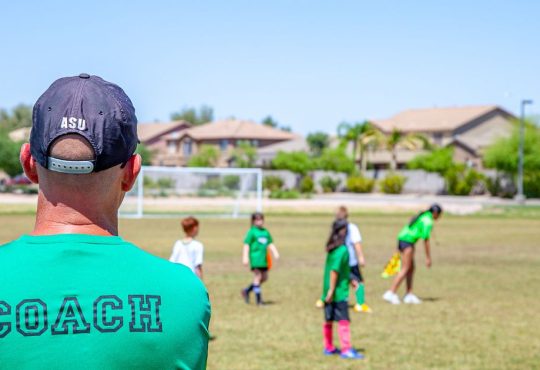Are you pondering whether to encourage your kids to play football and dream big about representing their country in the World Cup? This question resonates with many parents who see the joy in their children’s eyes when they kick a ball around. Football isn’t just a game; it’s a passion, a dream, and for some, a potential career path. But is it the right path for your child? Let’s dive into the benefits and challenges of encouraging your kids to play football and pursue a professional career on the grand stage of the World Cup.
Football, known as soccer in some parts of the world, is the world’s most popular sport. It’s a game that transcends borders, cultures, and languages. Encouraging your kids to play football can bring numerous benefits, from physical fitness to valuable life skills. However, aiming for a professional career and a chance to represent their country in the World Cup involves more than just love for the game. It requires dedication, hard work, and a bit of luck. In this article, we’ll explore why you might want to encourage your kids to play football, the potential benefits, and the realities of pursuing a professional football career.
The Benefits of Playing Football
Physical Health
Football is an excellent way to keep kids physically active. The sport requires running, jumping, and quick movements, which help improve cardiovascular health, strength, and endurance. Regular physical activity through football can also help prevent childhood obesity and associated health problems.
Mental and Emotional Well-being
Playing football isn’t just good for the body; it’s great for the mind. The game requires strategic thinking, quick decision-making, and teamwork, which can enhance cognitive abilities. Moreover, being part of a team provides a sense of belonging and can improve self-esteem and confidence.
Social Skills
Football is inherently a team sport, which means kids learn to work with others towards a common goal. This fosters communication skills, cooperation, and the ability to handle both winning and losing with grace. These social skills are invaluable and can benefit kids in many areas of life.
Discipline and Responsibility
To succeed in football, players need to practice regularly, follow rules, and respect their coaches and teammates. This helps instill discipline and a sense of responsibility. These traits can translate into other areas of their lives, including academics and future careers.
The Path to Becoming a Professional Football Player
Early Training and Development
If your child shows a keen interest in football, starting early can be beneficial. Many professional players began honing their skills at a young age. Look for local clubs or academies where they can receive proper training and coaching.
Balancing Education and Sports
While pursuing a football career, it’s crucial to balance education and sports. Education provides a fallback option and helps develop well-rounded individuals. Encourage your child to excel academically while pursuing their passion for football.
The Role of Parents
Parents play a significant role in a child’s football journey. Supportive parents can provide encouragement, attend games, and help manage the demands of training and schoolwork. However, it’s essential not to pressure children too much, as this can lead to burnout and loss of interest.
Challenges of Pursuing a Professional Football Career
Intense Competition
The path to becoming a professional football player is highly competitive. Thousands of kids dream of playing in the World Cup, but only a few make it. The competition can be intense, and the journey requires immense dedication and resilience.
Physical and Mental Demands
Professional football demands peak physical fitness and can be mentally taxing. Players often face rigorous training schedules, injuries, and the pressure to perform consistently. It’s essential to prepare kids for these challenges and ensure they have a strong support system.
Financial Investment
Pursuing a football career can be expensive. Training fees, equipment, travel for tournaments, and other related costs can add up. Families need to be prepared for the financial commitment and explore scholarships or sponsorship opportunities.
How to Support Your Child’s Football Dream
Provide Encouragement and Motivation
Encouragement from parents can significantly impact a child’s motivation. Celebrate their achievements, support them through challenges, and remind them that the journey is as important as the destination.
Ensure Proper Training
Quality coaching is crucial for skill development. Enroll your child in reputable football academies or clubs where they can receive professional training. This can make a significant difference in their progress and opportunities.
Maintain a Balanced Lifestyle
Encourage a balanced lifestyle that includes academics, social activities, and rest. Overtraining can lead to burnout and injuries. Ensure your child has time to relax and enjoy other hobbies.
The Reality of Professional Football
Limited Career Span
The career span of a professional football player is relatively short. Most players retire in their mid-30s, making it essential to plan for life after football. Education and skill development in other areas can provide a safety net.
Uncertainty and Risks
The journey to becoming a professional football player is uncertain. Injuries, changes in team selection, and other factors can impact a player’s career. It’s crucial to have a backup plan and manage expectations realistically.
Inspiring Stories of Football Legends
Lionel Messi
Lionel Messi’s journey from a small-town boy in Argentina to a global football icon is truly inspiring. Despite facing challenges like growth hormone deficiency, Messi’s passion, dedication, and hard work led him to become one of the greatest footballers of all time. His story highlights the importance of perseverance and believing in one’s dreams.
Megan Rapinoe
Megan Rapinoe, an American soccer player, has made significant contributions to women’s football. She has won numerous awards, including the FIFA Women’s World Cup. Rapinoe’s journey emphasizes the importance of resilience, hard work, and advocating for gender equality in sports.
Conclusion
Encouraging your kids to play football can bring numerous benefits, from physical fitness to valuable life skills. The sport fosters teamwork, discipline, and resilience, which are essential traits for personal and professional growth. However, pursuing a professional football career requires dedication, hard work, and a bit of luck.
While the dream of representing their country in the World Cup is inspiring, it’s crucial to balance their passion for football with education and a well-rounded life. Support your child’s dreams, provide the necessary resources, and help them navigate the challenges of this competitive field. With the right approach, football can be a source of joy, growth, and unforgettable experiences for your child.





